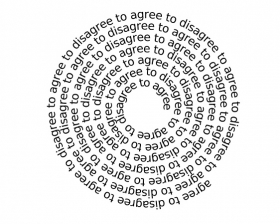The conventional wisdom is that funders investing in the same area should strive for agreement on a collective grantmaking strategy. It is easy to understand why: more resources for a common effort, clearer guidance to target everyone’s grants, and greater potential for collective impact.
But I think both agreeing and disagreeing can be important when funders wrestle with a complex issue. In fact I probably encourage friendly disagreement about as often as I try to help funders find common ground.
Why? Problems drawing multiple funders together are usually not simple or small. And when investments converge, it raises the stakes of decision-making. As funders grapple with a problem and ways to address it, having some friendly disagreement may bring in more information, surface valuable questions, and reality-check assumptions. At HEFN we try to encourage and normalize this.
Sometimes disagreement even gets baked into successful funder collaboration. For example, many HEFN members agree that widespread exposure to health-harming chemicals is a problem. They agree it is important to strengthen science, empower stakeholders, reform policies, and shift markets to safer materials. They regularly disagree about who to fund towards these goals, effectively “betting on different horses” while often also providing resources so that varied grantees can connect and collaborate.
This approach has helped diversify the field, enabled experimentation and continuous learning, and prepared different stakeholders to respond to unexpected opportunities or challenges. I think the movement tackling toxics is stronger because of it, with connections from neighborhoods to global forums, from polling places to legislatures, from boardrooms and laboratories to the marketplace. Some of the elements that help make friendly agreement a healthy part of funder collaboration:
- Put cards on the table: Straightforwardly share information about your interests, motivations, and biases.
- Assess costs and benefits: Make pragmatic decisions about whether potential benefits of collaborating will justify the costs of working together.
- Identify an authentic base of agreement: Find common ground and build trust in it, whether by sharing experiences or by articulating shared values or goals.
- Demonstrate respect: Cultivate respectful attitudes towards peers, grantees, other stakeholders… and for the complexities of social change problems and approaches.
- Value relationships: Spend time getting to know and regularly connecting with others who share values or concerns but may approach work from different angles.
- Invest in infrastructure: Invest in communications, convenings, and staff time to enable diverse grantees to connect, learn from one another, and work together.
In my experience, funders who develop a culture of respect, build good relationships, and invest in infrastructure can turn their diversity into more robust impact. But I welcome disagreement!
HEFN invites funders to join us in Chicago on November 13-14 for lively discussion, agreements and disagreements about ways to protect health and the environment from polluter influence. More information on HEFN’s 2012 annual meeting is here.


